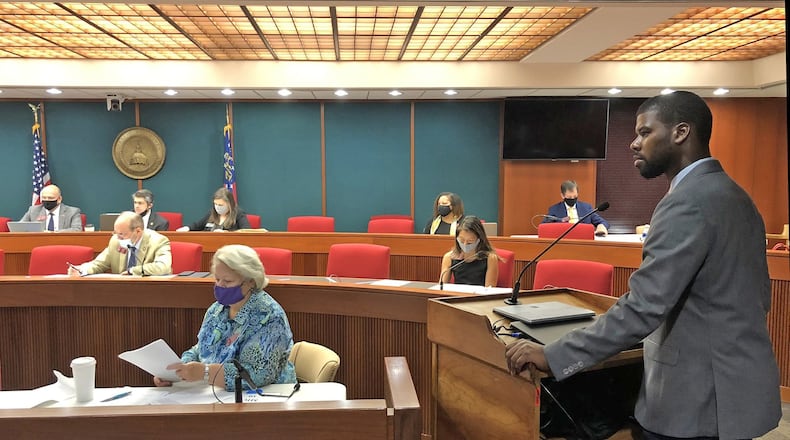A Georgia House committee voted Wednesday to prohibit election officials from mailing absentee ballot request forms to voters, as Secretary of State Brad Raffensperger did before this month’s primary election to encourage voting from home.
The legislation would prevent the kind of large-scale absentee voting effort undertaken during the coronavirus pandemic, when Raffensperger sent absentee ballot applications to 6.9 million Georgia voters.
Over half of primary voters, more than 1.1 million, then cast absentee-by-mail ballots in the election.
Democrats on the committee opposed the measure, Senate Bill 463, saying it would force more voters to go to precincts in November's election, with no guarantee that the public health threat will have abated by then.
"This bill seeks to make voting by mail harder," said Minority Leader Bob Trammell, a Democrat from Luthersville. "It takes away one of the successes of the primary — despite numerous failures on election day — which was the increased participation in vote by mail."
But the panel's Republican majority said the absentee ballot program caused problems for voters who never received their ballots or faced delays when they instead showed up at precincts on election day.
Election officials were overwhelmed by an unprecedented response to the absentee ballot effort, especially in Fulton County, where many voters reported that it took weeks for their ballot requests to be processed. Some voters said they never received their ballots.
"This does not in any way prevent anyone from asking for an absentee ballot or voting absentee," said House Governmental Affairs Chairman Shaw Blackmon, a Republican from Bonaire. "All this says is that we're not going to flood … this with unsolicited absentee ballots so that we actually create some problems for our counties."
Georgia law allows any voter to request an absentee ballot, but this bill would require them to initiate the absentee voting process rather than fill out a form that arrived in their mailbox.
Voters would have to download an absentee ballot request form and return it to their county election offices, or they could apply through an absentee ballot request website that Raffensperger is creating. The committee also passed a requirement in the bill to create that absentee ballot website.
Raffensperger had already said he didn't plan to repeat his absentee ballot request mailing initiative, but this legislation would make it state law that neither he nor local election officials could do so in the future.
“Voters on both sides of the political spectrum agree that sending absentee applications to all active voters was the safest and best thing our office could do to protect our voters at the peak of COVID-19,” Raffensperger said Wednesday. “Some seem to be saying that our office should have ignored the wave of absentee voting that was clearly coming.”
Political parties, advocacy organizations and voting groups could still mail absentee ballot request forms to voters on their own.
The effort to prevent the government from encouraging absentee voting comes after House Speaker David Ralston, a Republican from Blue Ridge, said he believed it could lead to fraud.
However, voting fraud is rare in Georgia, and state election officials haven't reported any allegations of illegal vote-by-mail efforts in this month's primary.
About 76,000 more Democratic Party voters cast absentee ballots in the primary than Republican Party voters. In all, about 600,000 voters pulled Democratic ballots, 524,000 used Republican ballots and 26,000 cast nonpartisan ballots.
Absentee voting doesn’t inherently favor one party or another, according to a statement from several voting rights and left-leaning groups.
“Georgia Republicans need to realize that vote by mail is a tool that can benefit either party and that localities, as well as the state, should maintain as many possible tools in their toolbox to promote vote by mail generally and certainly in the midst of a raging, ongoing health crisis,” according to a statement from the voting rights group Fair Fight Action, the Southern Center for Human Rights, the Georgia NAACP and other organizations.
At the same time legislators scaled back absentee voting, they also scuttled a proposal to add more voting locations.
The committee removed parts of the measure that would have required election officials to add precincts, poll workers or voting equipment if voters had to wait in line for more than an hour in the previous election.
The bill could receive a vote in the full House before the General Assembly finishes its annual legislative session Friday.
Georgia elections bill
In its current form, Senate Bill 463 would:
- Prohibit election officials from sending unsolicited absentee ballot applications to voters
- Require the secretary of state to set up a website where voters can request absentee ballots
- Permit poll workers to work in precincts outside their home counties
- Lower the age, from 75 to 70, that voters can move to the front of the line at precincts
Source: Senate Bill 463
About the Author
Keep Reading
The Latest
Featured





